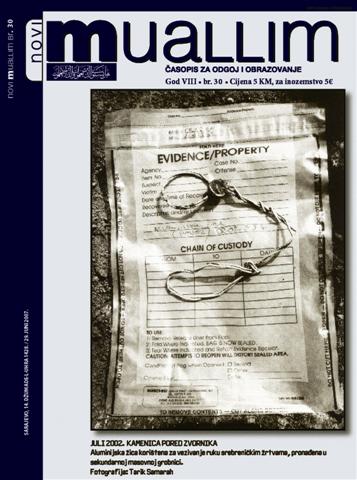ART OF OBLIVION
DOI:
https://doi.org/10.26340/muallim.v8i30.1031Abstract
An essential element for our future is discovering the truth about us and about our tragedy, the truth about crimes and intentions of others, but also in admitting our failure to recognize and prevent the tragedy, the fact wherein lie traces of our own responsibility for that same tragedy. What we surely as a society do not need is a life in the past; therefore the essential requirement is to do all in our power to establish an appropriate attitude towards our past especially in the time of the transition that we are undergoing. If we do not desire to live in the past, and we at the moment not only live in the past, but many of us still are enjoying the luxury of such life, we must understand causes an consequences which defined our past as criminal, genocidal, humiliating and destructive. Legacy of such a past, for those who experienced it and were its victims, represents an everlasting burden and source of frustration. The only way to prevent such frustration is through satisfaction of justice and truth, the mechanisms of the transition period. Justice and truth also represent the pillars of the system of values of Bosnian society as these are the requirements of modern conditions of life in 21st century. We can be sure of one thing that is we can not change our bloody and painful past. The only thing remaining is to explore and analyze our past and to make sure it does not happen again, and in case if it does, we could be prepared for it.
Downloads
Published
How to Cite
Issue
Section
License
Naknada:
a. Časopis ne naplaćuje naknadu za obradu članaka (APC) i naknadu za podnošenje članaka.
Autori koji objavljuju u ovom časopisu pristaju na sljedeće uvijete:
- Autori zadržavaju autorska prava i pružaju časopisu pravo prvog objavljivanja, pri čemu će rad jednu godinu po objavljivanju biti podložan licenci Creative Commons imenovanje koja omogućuje drugima da dijele rad uz uvijet navođenja autorstva i izvornog objavljivanja u ovom časopisu.
- Autori mogu izraditi zasebne, ugovorne aranžmane za ne-ekskluzivnu distribuciju rada objavljenog u časopisu (npr. postavljanje u institucionalni repozitorij ili objavljivanje u knjizi), uz navođenje da je rad izvorno objavljen u ovom časopisu.


